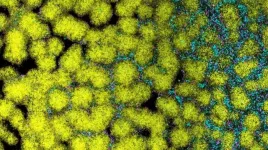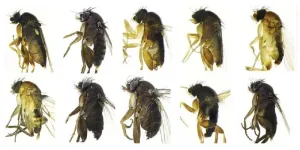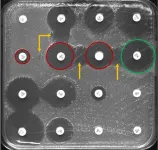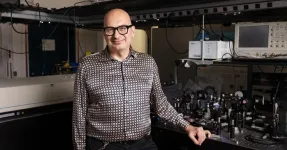(Press-News.org) (Boston)—Researchers from the Center for Regenerative Medicine (CReM) at Boston University and Boston Medical Center (BMC) have announced a new collaboration with the global biopharma company GSK to advance innovative research focused on developing cutting-edge models to study and treat lung diseases like pulmonary fibrosis.
Pulmonary fibrosis, including its most common form, idiopathic pulmonary fibrosis (IPF), is a progressive and life-threatening condition that results in scarring of the lungs, making it increasingly difficult for patients to breathe. While the causes of this disease are complex and not fully understood, lung epithelial cells—specifically those lining the tiny air sacs where oxygen exchange occurs—have been found to play a central role in its development.
Together with GSK, the Boston-based research team will focus on understanding how dysfunctional lung epithelial cells initiate and perpetuate the disease, including alveolar type 2 (AT2) cells, which are responsible for maintaining the lung’s delicate architecture.
“Genetic disruptions along with environmental factors can lead to stressed or dysfunctional epithelial cells, which initiate a cascade of signaling across immune cells and fibroblasts, ultimately leading to lung scarring. Identifying novel targets with high translational confidence therefore requires a deep understanding of the genetic and cellular basis of disease,” said Kaivan Khavandi, MD, PhD, SVP & Global Head of Respiratory/Immunology R&D at GSK. “By working together to establish this scientific discovery collaboration, we will combine state-of-the-art translational models at the CReM, with extensive multi-omic capabilities at GSK, to advance our understanding of the causal biology of fibrotic lung disease and accelerate the discovery of more effective treatments - which are so desperately needed in this area of respiratory medicine.”
In addition to focusing on epithelial cells, the research will take an innovative step forward by developing next-generation in vitro models that combine lung epithelial cells with stem cell-derived mesenchymal cells.
These advanced co-culture models will mimic the complex interactions between different cell types in the lung, providing a more realistic system for studying how pulmonary fibrosis develops. This approach will also enable scientists to identify and develop new drug targets to halt or slow the progression of the disease in a setting that closely resembles the human lung environment. The insights gained from this research could accelerate the development of more effective treatments for patients suffering from IPF and other forms of lung disease, potentially leading to life-saving therapies for all patients.
“Studying the crosstalk of lung epithelial and mesenchymal lineages using patient-derived stem cell and organoid-based model systems represents an exciting new direction for the field,” said Darrell Kotton, MD, director of the CReM, pulmonologist at BMC, and the David C. Seldin Professor of Medicine at Boston University Chobanian & Avedisian School of Medicine.
The new collaboration is expected to create a platform that will not only potentially advance the study of lung diseases but also enhance drug development efforts, offering hope to the many patients affected by these conditions. “Through this collaboration, we are poised to make significant advances in understanding the molecular mechanisms behind pulmonary fibrosis, which could ultimately transform how we treat these devastating diseases,” adds Kostas Alysandratos, MD, PhD, assistant professor of medicine at the school who is an investigator on the proposal and co-directs the Interstitial Lung Disease Clinic at BMC.
"At BMC, we are committed to conducting high-quality interdisciplinary research that is grounded in equity. 70% of our patient population identify as being people of color, and data suggest that Black patients with pulmonary fibrosis have worse health outcomes at younger ages compared to Hispanic or white patients. The collaboration with GSK will inform the development of new treatments for lung diseases that help address these disparities and pave the way for a healthier future for everyone,” says Megan Bair-Merritt, MD, MSCE, Chief Scientific Officer at BMC and professor of pediatrics at the school.
Contact: BU, Gina DiGravio, 617-358-7838, ginad@bu.edu; GSK, Sydney Dodson-Nease, 215-370-4680, sydney.a.dodson-nease@gsk.com
About Boston University Chobanian & Avedisian School of Medicine
Originally established in 1848, the New England Female Medical College became coed as Boston University School of Medicine in 1873. The school today is a leading academic medical center with an enrollment of more than 600 medical students and approximately 1,200 students pursuing Master's and PhD degrees. School of Medicine faculty attract more than $372 million in research awards annually, in Alzheimer’s disease, arthritis, cardiovascular disease, cancer, infectious diseases, pulmonary disease, amyloidosis, and dermatology, among other areas. The school’s 30 teaching affiliates include Boston Medical Center, Boston VA Healthcare System, St. Elizabeth’s Medical Center in Brighton, Mass., Kaiser Permanente in northern California, and many others. For more information, please visit http://www.bumc.bu.edu/camed/.
About Boston Medical Center
Boston Medical Center models a new kind of excellence in healthcare, where innovative and equitable care empowers all patients to thrive. We combine world-class clinicians and cutting-edge treatments with compassionate, quality care that extends beyond our walls. As an award-winning health equity leader, our diverse clinicians and staff interrogate racial disparities in care and partner with our community to dismantle systemic inequities. And as a national leader in research and the primary teaching affiliate for Boston University Chobanian & Avedisian School of Medicine, we’re driving the future of care.
END
BU, Boston Medical Center researchers join forces with GSK to fight lung diseases
2024-10-17
ELSE PRESS RELEASES FROM THIS DATE:
Bacteria thrive by playing nice before going their own way
2024-10-17
Biofilms — slimy communities of bacteria — grow on all sorts of surfaces: from glaciers and hot springs to plant roots, your bathtub and fridge, wounds, and medical devices such as catheters. Most biofilms are composed of multiple bacterial species, but how these species manage to live together is unclear.
A new study by Dartmouth scientists in Current Biology uses experiments and modeling to delve into how three species of biofilm bacteria coexist — and when they move out on their own. One species, Pseudomonas aeruginosa, a verstaile pathogen known to be antibiotic resistant, dominated ...
Identifying the genes that viruses ‘steal’ from ocean microbes
2024-10-17
COLUMBUS, Ohio – The microbes that cycle nutrients in the ocean don’t do the work on their own – the viruses that infect them also influence the process. It’s a vital job for the rest of the planet, enabling oceans to absorb half of the human-generated carbon in the atmosphere and produce half of the oxygen we breathe.
A new study gets scientists closer to more fully understanding where viruses fit into the global ocean picture of cycling nutrients such as nitrogen, phosphorous and, of particular interest, carbon. The research broadly expands on a 20-year-old finding that genes can be exchanged between viruses and the photosynthetic ...
CDC/PEPFAR awards Georgetown $27.5 million to address HIV/AIDS in Haiti
2024-10-17
WASHINGTON (Oct. 17, 2024) -- The U.S. Centers for Disease Control and Prevention (CDC) and the President’s Emergency Plan for AIDS Relief (PEPFAR), have awarded $27.5 million to the Center for Global Health Practice and Impact (CGHPI) at Georgetown University Medical Center to expand its ongoing work in Haiti to address HIV/AIDS.
For the 150,000 people in Haiti living with HIV, losing access to basic life-saving therapy can lead to unnecessary suffering, risk of transmission to others, and ...
Found hundreds of species using DNA barcoding
2024-10-17
The Earth is an almost unimaginably diverse planet in terms of species. Researchers have identified between two and three million species, but there are many more that we know nothing about.
The unknown species are called ‘biological dark matter’, borrowing a term from astrophysics.
“We want to demonstrate how we can gain a better overview of biological dark matter by using DNA barcoding,” said Associate Professor Emily Hartop.
DNA barcoding, in this case so-called ‘megabarcoding’, might sound mysterious, but it isn’t really. We will come back to that later. First, let us take a look at why ...
Unpaid caregiving is undervalued by society
2024-10-17
WASHINGTON — Americans believe volunteering to help strangers contributes more to society than providing care for family or friends, even though they contribute billions of dollars’ worth of labor in unpaid caregiving every year, according to research published by the American Psychological Association.
This perception could lead Americans of lower socioeconomic status to feel like they have less to contribute than people of higher socioeconomic status, because they often do not have the same amount of time or resources to devote to people outside of their communities.
“Over ...
AI helps to detect antibiotic resistance
2024-10-17
Researchers at the University of Zurich (UZH) have used artificial intelligence (AI) to help identify antibiotic-resistant bacteria. The team led by Adrian Egli, UZH professor at the Institute of Medical Microbiology, is the first to investigate how GPT-4, a powerful AI model developed by OpenAI, can be used to analyze antibiotic resistance.
The researchers used AI to interpret a common laboratory test known as the Kirby-Bauer disk diffusion test, which helps doctors to determine which antibiotics can or can’t fight a particular bacterial infection. Based on GPT-4, the scientists created the “EUCAST-GPT-expert”, which follows strict EUCAST ...
Scientific conference series aims to improve outcomes for diabetes, cancer and cardiovascular disease
2024-10-17
WASHINGTON—The Endocrine Society, a global organization that promotes endocrinology research and clinical practice, and Keystone Symposia, a nonprofit host of conferences and symposia on a range of life science and biomedical topics, will jointly host a series of three conferences to advance endocrine research.
The three conferences will focus on diabetes, oncology and cardiovascular disease—hormone-related conditions that have a major impact on public health. The conference series is slated to launch in late 2026 or early 2027 and will run ...
Quantum research breakthrough uses synthetic dimensions to efficiently process quantum information
2024-10-17
Quantum research breakthrough uses synthetic dimensions to efficiently process quantum information
The discovery, at INRS, of a synthetic photonic lattice capable of generating and manipulating quantum states of light, offers promising prospects for a variety of applications, from quantum computing to secure quantum communication protocols.
A study co-directed by Professor Roberto Morandotti of Institut national de la recherche scientifique (INRS) in collaboration with teams from Germany, Italy, and Japan opens the door to cutting-edge solutions ...
Putting out a brain on fire
2024-10-17
Imagine you wake up in a hospital without a single memory of the last month. Doctors say you had a series of violent episodes and paranoid delusions. You’d become convinced you were suffering from bipolar disorder. Then, after a special test, a neurologist diagnoses you with a rare autoimmune disease called anti-NMDAR encephalitis. This is what happened to Susannah Cahalan, a New York Post reporter who would go on to write the best-selling memoir Brain on Fire: My Month of Madness.
Anti-NMDAR encephalitis can lead to hallucinations, blackouts, and ...
Woods Hole Oceanographic Institution scientists discover fastest degrading bioplastic in seawater
2024-10-17
Woods Hole, Mass.(Oct. 17, 2024) — Scientists at the Wood Hole Oceanographic Institution (WHOI) have been working for years to find out what types of plastics have the shortest and longest lifespans in the ocean, and what types of plastic products, like straws and food wrappers, most commonly contribute to plastic pollution. With more biodegradable materials being developed , like cellulose diacetate (CDA)—a plastic-like polymer derived from wood pulp—researchers are racing to ensure they can replace traditional plastics without causing harm to ocean ...





